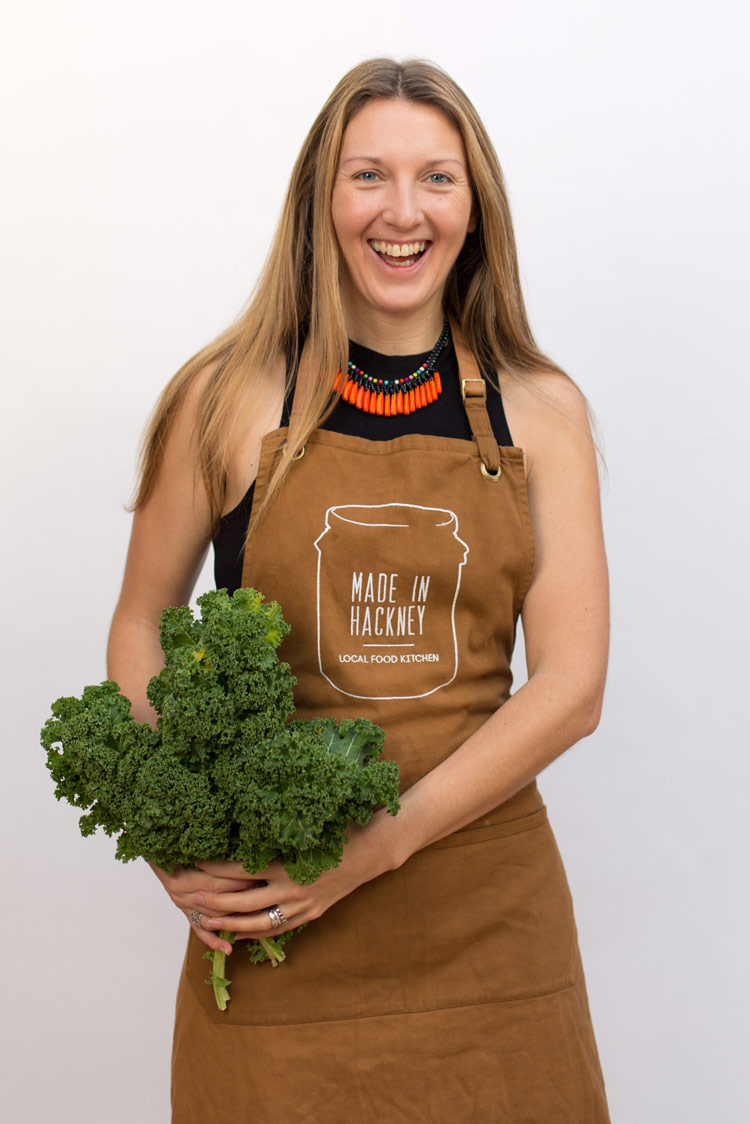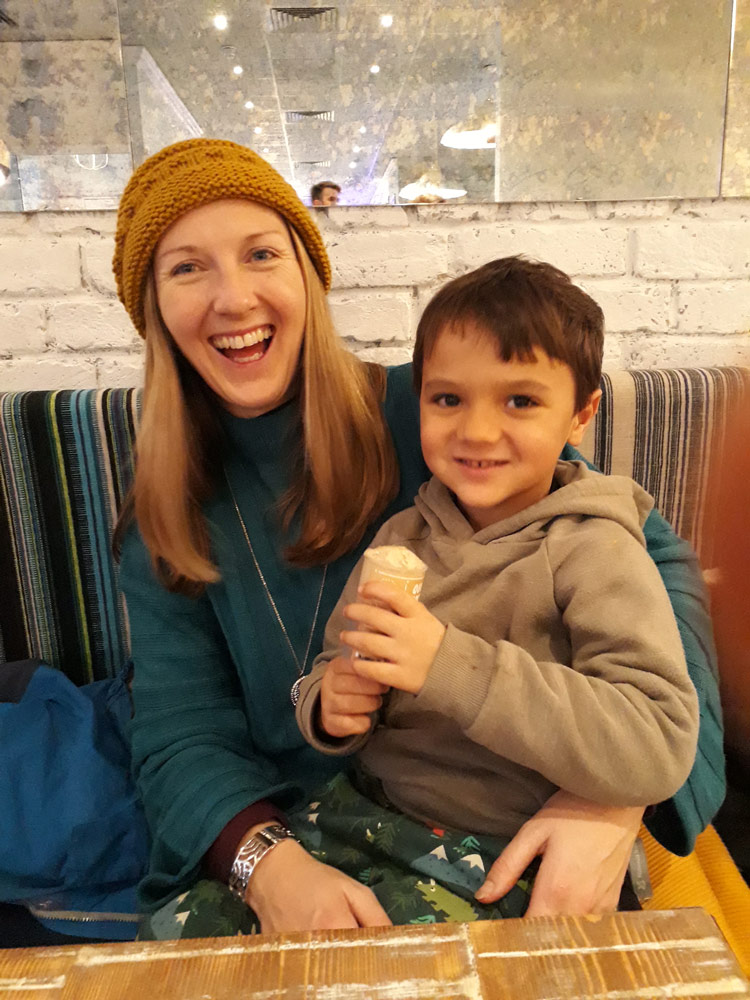When Eliza, my editor at Healthy Living London, suggested I reach out to Sarah Bentley for an interview on raising a plant-based family and her thoughts on the vegan movement more widely, I jumped at the chance. For those unfamiliar with Sarah’s work, she is one of the co-founders and project directors of the first ever 100% plant-based, eco, community kitchen, Made in Hackney, a company whose aim is to help people live healthier, happier, more connected and environmentally sustainable lives. Through vegan cookery courses – which extend to growing, cooking, preserving and composting food produce – Made in Hackney works to make healthy, seasonal and sustainably produced food accessible and affordable. The team also aim to bring together and inspire communities and to give individuals the skills they need to help ‘green the urban environment’.

Former journalist and university lecturer, Bentley, and co-founder, Joshana Lovage, established Made in Hackney in 2012. Since then, their work has brought them to the centre of London’s organic, local, plant-based food movement.
In her own words, she asserts that:
‘By working on re-localising food systems you’re having a positive impact on a huge range of issues – food poverty, inequality, climate change, reducing corporate control of our food, health and wellbeing – it’s a hugely inspiring and rewarding area to work in.’
Sarah’s work in this area is so inspiring and I was so interested to learn more about her shift in career, her motivations and inspirations, her decision to raise her son plant-based, and her thoughts on the future of the company.
What was the catalyst that motivated you to move away from journalism and lecturing and into environmental and ecological activism? Was there one particular conversation / book / documentary / experience that drove you in this direction?
A gradual and building desire to do something with a tangible impact as opposed to just writing about other people’s projects and actions. Also after 12 years of journalism I was ready for a new challenge. There wasn’t just one book or documentary [that motivated me] but many: Michael Pollen’s documentary, Food Inc., the amazing film Symphony of the Soil, the Transition Town movement, learning about permaculture, signing up to the Growing Communities veg bag scheme and getting heavily involved with that as a volunteer and then a grower.
Did you eat a plant-based diet before this?
Yes I became vegetarian at age nine by my own volition. I was the only vegetarian in my family. I’d been thinking about it since I was about eight and then I read an article in one of my mum’s magazines about the horrendous journey that animals make to the slaughter house and I cried and cried. I could not believe the adult world would let this happen. I felt so let down and like I could no longer trust or take for granted that the behaviour of the adults around me was always right or for the best. That made for quite an opinionated young lady! I got into cooking delicious super healthy plant based meals when I was 23 (before that I was an unhealthy veggie and then vegan).
How old is your son and how was your decision to raise him on a vegan diet received by your friends and family?
My son, Rowan is four and a half. I was always the veggie and then vegan one in my family and friendship groups so no one was surprised I was going to raise Rowan vegan. The occasional friend asked me if I was (which I thought was totally weird) and sounded slightly perturbed when they asked, but I think they knew they’d get such a fire brand response they didn’t push it!
Did you have any concerns about raising your son on a vegan diet?
A little, yes, because of the way kids can be picky and not eat all the things that you as an informed adult eat. I did a lot more research than I ever had for my diet and learnt about challenging areas such as B12, K2 and Omega DHA and EPA, iron etc. and read a few books and online and in the end I satisfied myself.
I do occasionally allow Rowan to eat eggs if they’re from much loved ‘back garden’ hens who are free to roam about and will be looked after and loved even after they stop laying eggs. I always ask ‘what happens to all your chicks’ and ‘what’s the retirement plan for your hens? If they stop laying do you kill them and eat them or do you keep loving them and feeding them and allowing them to just be’. It has to be the latter for me to let Rowan eat those eggs. The only reason I do that is because since he was two years old Rowan went a bit mono food and ate a lot less variety of ingredients so the occasional egg from very happy ethical hens who are much loved I am OK with although I don’t like watching him eat them.
Likewise when we travelled in remote parts of Morocco there really wasn’t much vegan food at all. I survived on rice, almonds and lentils but Rowan won’t eat lentils so I was relieved at that point he could eat eggs from the local hens who roamed around the villages freely and I knew his system would tolerate them as he has them very occasionally.
I know quite a lot of vegan families – including raw vegan chef Kate Magic – who sometimes let their kids eat eggs from back yard hens. But if your child eats a wide variety of foods you absolutely do not need to eat eggs to be healthy if you don’t want them to do this. I actually would rather he didn’t but I had to reflect on what my reasons where for this and whether the same applied in all situations. He would never ever eat eggs from the industrialised system. Such a horror. Chicks being thrown into grinders and all sorts. Horrendous.
Is he aware that his diet is different to that of his peers and does he understand why this is?
He knows he’s vegan yes and is proud of this. Thankfully at his forest school nursery there are six other vegan children, which is amazing. Plus all his friends and families we have connected to are naturally very supportive of our diet choices and make an effort to explain it to their kids and cook for us. It’s very sweet and I really appreciate it.
I think he understands why yes but only time will tell. He gets upset and cross when he see’s fish caught in nets in children’s books and animals in cages in zoos and all that. We refer to farms in all the children’s books and toys as animal sanctuaries and he knows on farms they usually only look after animals to then sell them or kill them. The nonsense bucolic idea of farms I was never going to let him buy into.

What are his favourite plant-based meals/snacks?
Vegan sushi, he loves it. Homemade teriyaki tofu, homemade waffles, rainbow coloured homemade ice lollies, tahini chocolate hearts, homemade cheesy cashew kale crisps, cashew ice cream, all flavours of kombucha and crudités. He likes simple, uncomplicated food bless him.
Is there any advice that you would pass on to mothers thinking of raising their children on a plant-based diet?
Wow so much I could write a book on it. I would not know where to start here in just a few sentences. I guess learn some basic nutrition and learn how to cook. These are essential skills to raising a healthy vegan child.
Do any of your courses cover plant-based eating for babies and young children?
Our Cooking for Life family classes cover plant-based eating for families specifically, but all the food is vegan and so suitable for vegan families and babies. We did a weaning workshop once and it was popular.
How do you see the Made in Hackney project developing over the coming years? Do you see this as a model for other plant-based community kitchens around London and eventually around the country more widely?
We actually work all over the capital already so we take our programme and classes to different venues. Yes it could definitely be rolled out nationally and we’re working on securing funding to offer a mentoring scheme to help other people get up and running.
Have you found attitudes to plant-based cooking have shifted in recent years with the growth of the vegan movement?
Yes massively – beyond my wildest dreams. It’s amazing.
Is there one message that you would like your visitors to take away from their time at Made in Hackney?
Plant-based meals can be tasty, nutritious and fun to make. Even if you don’t go vegan, you can make these meals a regular part of you and your family’s diet.
What is your favourite, or the most popular, recipe from your cookery school?
Our sweet potato and plantain Caribbean curry. Our chef Mark Breen made this for 200 people at our summer party last year with a team of about 12 kitchen volunteers. It was intense!
The recipe can be found here.
If you could direct readers towards a book, blog, documentary, podcast or TED talk to help shift their perspective on food and the environment what would this be?
Earthling Eds instagram account, the documentaries Cowspiracy and Earthlings (which is about factory farming and is disturbing viewing). Also Simon Amstell’s film Carnage is amazing.
In terms of a food hero though mine is Vandana Shiva. She’s a scientist and Indian agriculture activist. She’s incredible and definitely a big influence on my sustainable food journey.
If you were to run a course tomorrow with your dream line-up of guests, who would be there?
I’d love to have all the vegan neigh-sayers like Jeremy Clarkson and Piers Morgan so we could wow them with our good vibes and amazing food. It might not change their views on veganism overnight, but we’d be willing to give it a shot! Spending a few hours with them could be a bit painful, but we’re open to give it a try!!!
You can find out more about Made in Hackney at madeinhackney.org and on Instagram at @madeinhackney You can follow Sarah Bentley on Instagram @bentley_sarah
Leave a Reply